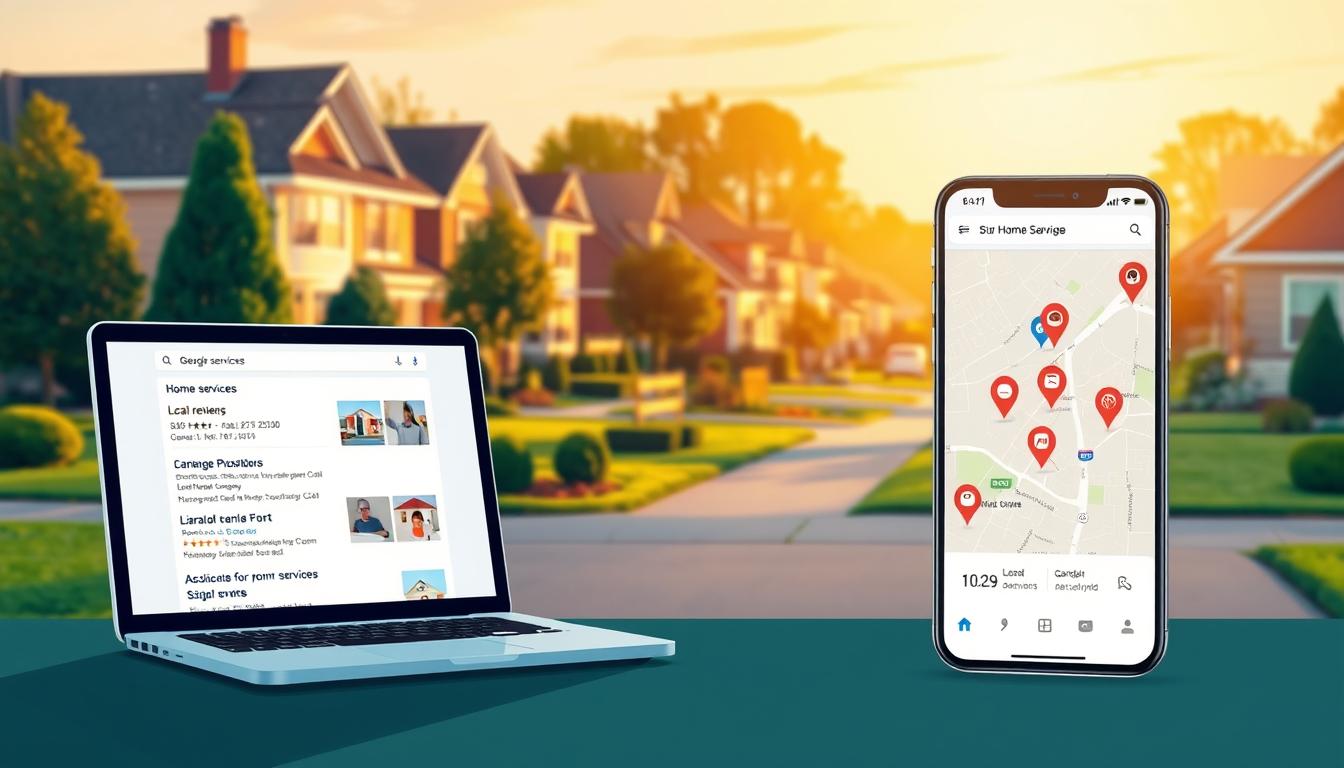Did you know that 98% of consumers research companies online before making contact? Even more surprising, nearly all local searches lead to action within 24 hours. For companies offering specialized solutions, this digital-first behavior isn’t just a trend—it’s the new reality.
Let me show you why mastering online visibility matters more than ever. Traditional methods like flyers or billboards can’t compete with the precision of connecting directly to customers searching for exactly what you offer. The key lies in understanding how modern search habits work in your favor.
You’ll learn how tailored strategies help you stand out in specific neighborhoods. We’ll break down the core elements that boost your rankings, from optimizing profiles to gathering authentic reviews. These aren’t just theories—they’re proven tactics that drive real growth.
Imagine cutting ad costs while attracting higher-quality leads. That’s the power of aligning your efforts with how people actually find solutions today. Ready to transform how your company connects with its community?

Key Takeaways
- Nearly all customers research companies online before engaging
- Tailored strategies outperform generic marketing approaches
- Optimized profiles and reviews significantly impact visibility
- Effective techniques reduce reliance on paid advertising
- Localized efforts attract higher-intent customers faster
Understanding Local SEO for Home Service Businesses
Think about the last time you needed urgent repairs. Did you scroll through endless options or pick the first reliable result? That split-second decision is why getting found online matters. Let’s break down how to become the top choice when neighbors need help fast.
What Is Local SEO and Why It Matters
This strategy focuses on three essentials: your specialty, service area, and unique value. Unlike broader marketing, it’s about showing up when someone types “plumber near me” at 2 AM. Search engines prioritize businesses with complete profiles, positive feedback, and clear location signals.
Imagine two scenarios. A burst pipe requires immediate attention. Or a family plans a kitchen remodel. In both cases, your visibility determines whether you’re chosen. Proper optimization makes you the go-to solution during these critical moments.
How This Approach Benefits My Company
You’re not battling every provider nationwide—just those in your backyard. By emphasizing neighborhood relevance, you attract clients ready to hire. Detailed profiles and authentic reviews build trust faster than any ad campaign.
Mobile users often decide within minutes. If your contact info appears instantly with stellar ratings, you’ve already won. This method cuts through noise, connecting you directly with high-intent clients who value quality and quick responses.
The Role of Google Business Profile in Local SEO
How often do people scroll past the first search result? Your digital storefront needs to grab attention instantly. A well-crafted Google Business Profile acts like a 24/7 salesperson, showcasing your expertise before customers even click.
Optimizing Your Profile for Maximum Visibility
Start by verifying every detail – name, address, and phone number must match across platforms. Choose specific categories like “Emergency Plumbing” instead of generic terms. This tells Google exactly where you excel.
Add service areas and operating hours that reflect real customer needs. Night owls searching for HVAC repairs at midnight? Highlight emergency availability. Use high-resolution photos of completed projects – they’re 42% more likely to earn inquiries.
Activate booking buttons and weekly posts about seasonal promotions. These features boost engagement while keeping your profile fresh in search results. Remember, profiles updated monthly get 30% more views.
Managing Reviews and Customer Engagement
Positive reviews are digital word-of-mouth. Politely ask satisfied clients to share their experiences – template responses make this easy. Always personalize replies to negative feedback; it shows you value improvement.
Monitor the Q&A section daily. Quick answers to “Do you offer weekend appointments?” prevent lost leads. Turn on notifications so you never miss a potential booking.
Update service descriptions during peak seasons. Highlight furnace checks in winter or AC tune-ups in summer. These tweaks help you appear for urgent searches when decisions happen fastest.
Conducting Keyword Research for Home Service Success
What if you could read your customers’ minds? Keyword research does exactly that by revealing the exact phrases people type when seeking solutions. This isn’t guesswork—it’s about aligning your content with real-world needs.

Identifying High-Impact Keywords for My Business
Start by listing core offerings and locations. For example, “Emergency Plumbing Services in Austin” combines urgency, specialty, and geography. Tools like Google Autocomplete show popular queries as you type—goldmines for discovering hidden opportunities.
Longer phrases like “24-hour water heater repair” attract targeted traffic. These specific terms often convert better than generic ones. Balance broad terms with niche phrases to cover both immediate needs and planned projects.
Analyze competitors’ gaps using free tools. The “People Also Ask” section reveals related concerns you might overlook. Create separate lists for seasonal trends—think “frozen pipe thawing” in winter or “AC installation” in summer.
Update your strategy quarterly. Search habits evolve, and staying ahead means adapting to new patterns. Track which phrases drive calls or bookings, then refine your focus for maximum impact.
On-Page SEO Optimization Techniques
Your website is your digital toolbox—every element needs precise calibration. Let’s explore how small tweaks to your pages can create big visibility improvements. These methods work like signposts, guiding both visitors and search engines to your best solutions.
Optimizing Meta Tags and Descriptions
Think of title tags as neon signs. “24/7 HVAC Repair | Dallas Experts” instantly communicates urgency and expertise. Keep them under 60 characters to avoid truncation. Meta descriptions should answer the question “Why choose us?” in 155 characters. Use action verbs like “Fix leaks today” to drive clicks.
SEO-Friendly URL Structures
Clean URLs act like street addresses for your content. Compare “yourwebsite.com/blog/123” versus “yourwebsite.com/emergency-plumbing-tips”. The second option tells users exactly what to expect. Use hyphens instead of underscores, and include location modifiers only when relevant.
Strategic Keyword Placement in Content
Keywords belong in natural conversation points. Include them in the first 100 words of your page, then reinforce them in subheadings and image captions. Balance is key—one primary phrase per page, supported by related terms. Tools like Hemingway Editor help maintain readability while hitting optimization targets.
Header tags (H1/H2) create clear content roadmaps. For service pages, structure them as “Service + Location + Benefit”. Image file names matter too—rename “IMG_1234.jpg” to “kitchen-remodel-austin.jpg”. These adjustments compound over time, making your website content more discoverable and actionable.
Creating High-Quality Content that Engages Local Customers
Ever wondered why some companies dominate neighborhood conversations? It starts with content that answers real questions during critical moments. Let’s explore how to craft material that turns casual browsers into loyal clients.
Generating Relevant, Local Topics
Start by solving urgent problems homeowners face. Create guides like “Preventing Frozen Pipes During Midwest Winters” or “Choosing Drought-Resistant Plants in Arizona”. These pieces position you as the expert who understands regional challenges.
Use free tools like AnswerThePublic to find questions people ask. Topics like “Why does my AC smell musty?” become actionable blog posts. Pair these with videos showing quick fixes – 80% of users remember visual content better.
Developing a Consistent Content Calendar
Plan monthly themes around seasonal needs. January could focus on post-holiday electrical safety checks, while May highlights pool installation prep. Schedule posts every Tuesday when DIY searches peak.
Repurpose articles into social media carousels or email checklists. A single guide about “Detecting Water Leaks Early” becomes 10 Instagram stories, a podcast episode, and a printable PDF. This multiplies your reach without extra work.
Track which topics drive phone calls or form submissions. Double down on what works, and refresh older posts with new data. Consistent updates tell search engines your site stays current – a key ranking factor.
Building Citations and Consistent NAP Listings
Ever notice how your favorite coffee shop appears everywhere online? That’s the power of consistency. For companies, having matching details across platforms builds trust faster than a barista remembers your order.

Start by auditing every place your company appears. Search for variations of your name, address, and phone number. You might find old listings with outdated area codes or misspelled streets. These errors confuse both customers and search algorithms.
Managing Your Business Listings Across Directories
Platforms like Angi and Houzz act as digital billboards. Claim your profiles there first—they’re where homeowners compare options. Use identical wording for your business name and services. Even small differences (“24/7 Plumbing” vs “24-Hour Plumbing”) create confusion.
Create a master document with your exact address, phone number, and service descriptions. Update this file whenever you expand or change hours. Share it with anyone managing your online presence to prevent mix-ups.
Check regional directories and trade associations too. A listing with the local chamber of commerce adds credibility. Set quarterly reminders to review all platforms. Fix mismatches quickly—like tightening loose pipes before they burst.
Consistency isn’t just about accuracy. It’s about making your company unforgettable across every touchpoint. When your information matches everywhere, you become the obvious choice in moments of need.
Encouraging and Managing Customer Reviews
Your online reputation works like a digital handshake—it’s often the first impression customers get. Positive feedback builds credibility, while thoughtful responses to criticism show you care. Let’s explore how to turn every interaction into an opportunity to strengthen trust.
Collecting Positive Reviews Effectively
Ask for feedback when satisfaction peaks—right after completing a successful job. Send a text with a direct review link to make it effortless. QR codes on invoices or service cards let customers share experiences in seconds.
Train your team to mention reviews casually during follow-ups. Phrases like “We’d love your thoughts!” feel natural. Track results monthly and celebrate when you hit milestones—it keeps everyone motivated.
Responding to Negative Feedback with Care
Address criticism within 24 hours. Start with “Thank you for helping us improve” to show openness. Offer solutions publicly, then take detailed conversations offline. This approach turns frustrated clients into loyal advocates.
Analyze feedback trends quarterly. If multiple reviews mention scheduling issues, streamline your booking process. Every critique holds clues to becoming better at what you do.
Leveraging Local Link Building for Authority
What do neighborhood newsletters and charity events have in common? They’re golden opportunities to build authority-boosting backlinks. I focus on creating partnerships with schools, chambers of commerce, and regional blogs. A mention in their resources acts like a trusted recommendation.
Start by offering value first. Sponsor a little league team in exchange for a website shoutout. Collaborate with nearby contractors on “extreme weather prep” guides. These efforts earn organic mentions while strengthening community ties.
Track where competitors get cited using free tools. Then pitch unique angles they’ve missed—like hosting free workshops on energy efficiency. Media outlets often feature practical stories that help residents solve problems.
Quality beats quantity every time. One link from a respected .org site outweighs dozens of random directories. Focus on relationships that position you as a knowledgeable ally, not just another vendor. Over time, these connections compound your visibility and credibility.
See how FieldAx can transform your Field Operations.
Try it today! Book Demo
You are one click away from your customized FieldAx Demo!
FAQ
How often should I update my Google Business Profile?
I refresh mine weekly with new photos, respond to reviews, and adjust service hours during holidays. Regular updates signal activity to Google, which can boost visibility in search results.
What’s the fastest way to improve my website’s local ranking?
Start by optimizing title tags and descriptions with location-based keywords like “emergency plumber in Austin.” Pair this with consistent NAP (Name, Address, Phone) listings on directories like Yelp or Yellow Pages.
Can social media impact my search engine performance?
Yes! Sharing website content on platforms like Facebook or Nextdoor drives traffic and builds trust. Google notices this engagement, which can indirectly lift your rankings for relevant local searches.
Should I prioritize reviews over other digital marketing efforts?
Reviews matter, but balance is key. I focus on review management while also building backlinks from local sites like chamber of commerce pages. A mix of 5-star feedback and authoritative links creates lasting credibility.
How do I handle a competitor outranking me for my target keywords?
I analyze their strategy using tools like Ahrefs or BrightLocal. Often, improving on-page optimization or creating hyper-local content (e.g., “roof repair in Downtown Miami”) helps carve out a niche they’ve overlooked.
Why does my phone number need to be consistent everywhere online?
Google cross-checks your contact information across directories. Mismatched details confuse the algorithm and hurt visibility. I use a dedicated business line and audit listings quarterly to ensure accuracy.
Is blogging still effective for attracting nearby customers?
Absolutely. I write about seasonal needs (“Preparing Your HVAC for Texas Summers”) or answer FAQs from clients. This builds topical authority and answers queries people type into search engines daily.
Author Bio
Co-Founder & CMO at Merfantz Technologies Pvt Ltd | Marketing Manager for FieldAx Field Service Software | Salesforce All-Star Ranger and Community Contributor | Salesforce Content Creation for Knowledge Sharing






